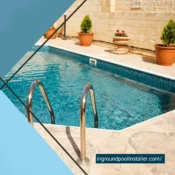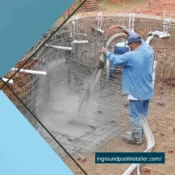Navigating Zoning Laws: What Every Homeowner Needs to Know Before Installing an Inground Pool

Navigating Zoning Laws: What Every Homeowner Needs to Know Before Installing an Inground Pool
As you contemplate the addition of an inground pool to your property, it is crucial to tread thoughtfully through the maze of zoning laws. This comprehensive guide is designed to facilitate your understanding of these complex regulations and permit requirements.
It aims to equip you, the homeowner, with the necessary knowledge to navigate the legal landscape before embarking on your pool installation project. By fostering a sense of belonging within the community of responsible homeowners, we hope you find this information both empowering and instructive.
Let's dive into the intricacies of zoning laws and permits, ensuring your dream pool becomes a reality in alignment with local regulations.
Understanding Zoning Laws for Pools
Understanding the intricacies of zoning laws is paramount for homeowners contemplating the addition of an inground pool to their property. These laws, designed to maintain orderly development and harmonious land use, may vary significantly from one jurisdiction to another. They dictate the permissible locations, sizes, depths, and safety features of pools within the property boundaries.
Therefore, a thorough comprehension of these laws helps avoid future legal complications, unexpected costs, and delays in pool construction. In addition, understanding zoning laws fosters a sense of belonging as homeowners align their property enhancements with the communal ethos.
Hence, before embarking on the pool installation journey, homeowners need to consult with local zoning authorities or legal experts to ensure conformity with all applicable zoning laws.
Permit Requirements for Inground Pools
The process of adhering to zoning laws also involves securing the necessary permits before commencing the installation of an inground pool. Without these permits in place, you may face serious legal consequences.
Permit requirements vary by location, but typically include:
- Building Permit: This is necessary for any significant construction project and ensures that the pool meets local building codes.
- Electrical Permit: This is required for the installation of pool lighting and electrical systems.
- Plumbing Permit: This permit certifies that the pool's plumbing system is up to code.
These permits not only protect you as a homeowner, but also ensure the safety and wellbeing of your community. It is crucial to familiarize yourself with these requirements and adhere to them closely.
All Categories
- Concrete
- Concrete
- Concrete pools
- Construction
- Custom Features and Add-ons
- Design
- Design
- Design
- Design & Construction
- Design and Planning
- Features & Customization
- Infinity edge
- inground pool
- inground pool builder
- inground pool installer
- Installation
- Installation Process
- Legal & Administrative
- Materials
- planning and design
- Pool Aesthetics and Customization
- Pool Design
- Pool Equipment
- Pool Features
- Pool Features
- Pool Installation Process
- Pool Materials
- Pool Materials
- Pool Types
- Project Planning
- Renovation
- Resurfacing
- top sights
- Types of Inground Pools
- Types of Inground Pools
- Types of Inground Pools
- Types of Inground Pools
- Water Treatment



